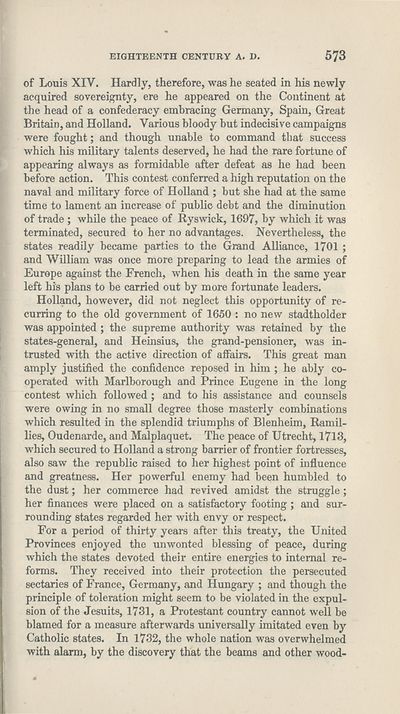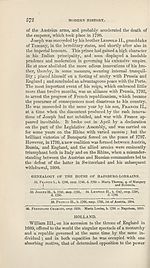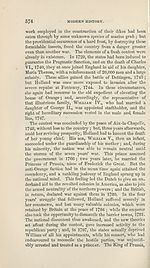Download files
Complete book:
Individual page:
Thumbnail gallery: Grid view | List view

EIGHTEENTH CENTURY A. I).
573
of Louis XIV. Hardly, therefore, was he seated in his newly
I acquired sovereignty, ere he appeared on the Continent at
I the head of a confederacy embracing Germany, Spain, Great
I Britain, and Holland. Various bloody but indecisive campaigns
were fought; and though unable to command that success
i which his military talents deserved, he had the rare fortune of
l appearing always as formidable after defeat as he had been
| before action. This contest conferred a high reputation on the
I naval and military force of Holland ; but she had at the same
j time to lament an increase of public debt and the diminution
I of trade ; while the peace of Ryswick, 1697, by which it was
1* terminated, secured to her no advantages. Nevertheless, the
states readily became parties to the Grand Alliance, 1701 ;
and William was once more preparing to lead the armies of
Europe against the French, when his death in the same year
I left his plans to be carried out by more fortunate leaders.
Holland, however, did not neglect this opportunity of re-
I curring to the old government of 1650 : no new stadtholder
i was appointed ; the supreme authority was retained by the
states-general, and Heinsius, the grand-pensioner, was in-
j trusted with the active direction of affairs. This great man
[; amply justified the confidence reposed in him ; he ably co¬
operated with Marlborough and Prince Eugene in the long
contest which followed ; and to his assistance and counsels
were owing in no small degree those masterly combinations
which resulted in the splendid triumphs of Blenheim, Ramil-
lies, Oudenarde, and Malplaquet. The peace of Utrecht, 1713,
which secured to Holland a strong barrier of frontier fortresses,
also saw the republic raised to her highest point of influence
and greatness. Her powerful enemy had been humbled to
_ the dust; her commerce had revived amidst the struggle;
i her finances were placed on a satisfactory footing; and sur-
i rounding states regarded her with envy or respect.
For a period of thirty years after this treaty, the United
Provinces enjoyed the unwonted blessing of peace, during
which the states devoted their entire energies to internal re¬
forms. They received into their protection the persecuted
! sectaries of France, Germany, and Hungary ; and though the
principle of toleration might seem to be violated in the expul¬
sion of the Jesuits, 1731, a Protestant country cannot well be
blamed for a measure afterwards universally imitated even by
Catholic states. In 1732, the whole nation was overwhelmed
with alarm, by the discovery that the beams and other wood-
573
of Louis XIV. Hardly, therefore, was he seated in his newly
I acquired sovereignty, ere he appeared on the Continent at
I the head of a confederacy embracing Germany, Spain, Great
I Britain, and Holland. Various bloody but indecisive campaigns
were fought; and though unable to command that success
i which his military talents deserved, he had the rare fortune of
l appearing always as formidable after defeat as he had been
| before action. This contest conferred a high reputation on the
I naval and military force of Holland ; but she had at the same
j time to lament an increase of public debt and the diminution
I of trade ; while the peace of Ryswick, 1697, by which it was
1* terminated, secured to her no advantages. Nevertheless, the
states readily became parties to the Grand Alliance, 1701 ;
and William was once more preparing to lead the armies of
Europe against the French, when his death in the same year
I left his plans to be carried out by more fortunate leaders.
Holland, however, did not neglect this opportunity of re-
I curring to the old government of 1650 : no new stadtholder
i was appointed ; the supreme authority was retained by the
states-general, and Heinsius, the grand-pensioner, was in-
j trusted with the active direction of affairs. This great man
[; amply justified the confidence reposed in him ; he ably co¬
operated with Marlborough and Prince Eugene in the long
contest which followed ; and to his assistance and counsels
were owing in no small degree those masterly combinations
which resulted in the splendid triumphs of Blenheim, Ramil-
lies, Oudenarde, and Malplaquet. The peace of Utrecht, 1713,
which secured to Holland a strong barrier of frontier fortresses,
also saw the republic raised to her highest point of influence
and greatness. Her powerful enemy had been humbled to
_ the dust; her commerce had revived amidst the struggle;
i her finances were placed on a satisfactory footing; and sur-
i rounding states regarded her with envy or respect.
For a period of thirty years after this treaty, the United
Provinces enjoyed the unwonted blessing of peace, during
which the states devoted their entire energies to internal re¬
forms. They received into their protection the persecuted
! sectaries of France, Germany, and Hungary ; and though the
principle of toleration might seem to be violated in the expul¬
sion of the Jesuits, 1731, a Protestant country cannot well be
blamed for a measure afterwards universally imitated even by
Catholic states. In 1732, the whole nation was overwhelmed
with alarm, by the discovery that the beams and other wood-
Set display mode to:
![]() Universal Viewer |
Universal Viewer | ![]() Mirador |
Large image | Transcription
Mirador |
Large image | Transcription
| Antiquarian books of Scotland > Education > Elements of universal history on a new and systematic plan > (593) |
|---|
| Permanent URL | https://digital.nls.uk/127587256 |
|---|
| Description | Thousands of printed books from the Antiquarian Books of Scotland collection which dates from 1641 to the 1980s. The collection consists of 14,800 books which were published in Scotland or have a Scottish connection, e.g. through the author, printer or owner. Subjects covered include sport, education, diseases, adventure, occupations, Jacobites, politics and religion. Among the 29 languages represented are English, Gaelic, Italian, French, Russian and Swedish. |
|---|

